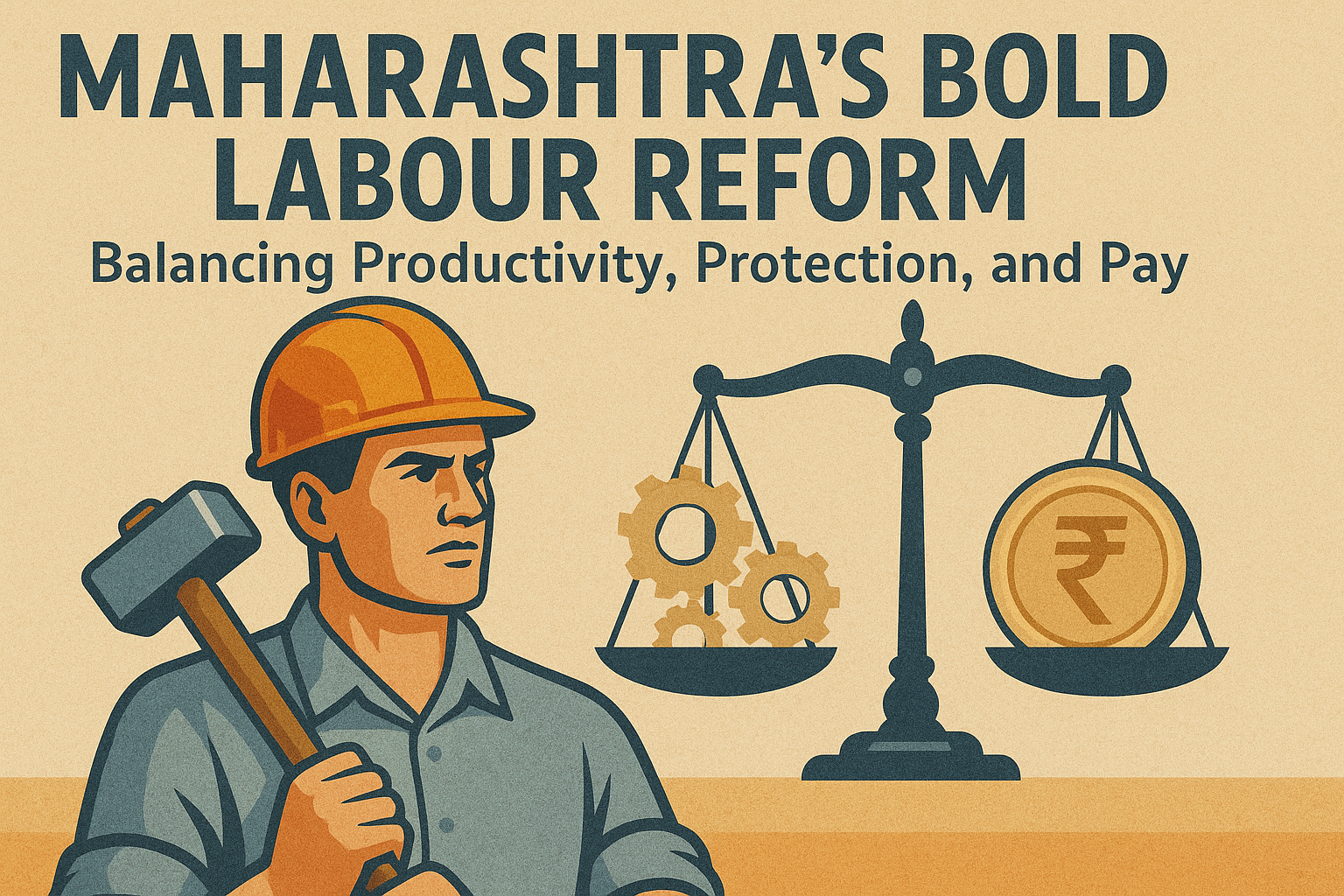
Maharashtra’s Bold Labour Reform: Balancing Productivity, Protection, and Pay
Labour laws are often mirrors of society’s priorities. For decades, India’s regulatory framework has been accused of being rigid for employers while being inadequate for employees. This week, the Maharashtra government attempted a recalibration: more work, more pay, and, if managed well, more jobs.
At the heart of the reform is a simple yet sensitive decision: increasing the maximum daily working hours for private sector employees from nine to ten. For factories and industries, the limit moves from nine to twelve hours, provided overtime compensation is paid. On paper, this is just an extra hour or two. In practice, it could reshape the way businesses operate and workers earn.
The Fine Print
The change will be implemented by amending the Maharashtra Shops and Establishments Act, 2017, and the Factories Act, 1948. Employers can now ask workers to clock in more hours—up to 60 hours a week and 144 hours a quarter—but only with their written consent. Anything beyond the standard nine hours a day and 48 hours a week qualifies as overtime. Crucially, that overtime must be compensated at double the basic wage plus allowances.
For employees, this is not a diktat but an option. The labour department has been careful to stress that the new framework is consent-based. “Nothing in the amended laws is compulsion,” explained Idzes Kundan, the state’s labour secretary. Employers cannot force overtime; they must secure written approval.
The amendments also tweak other norms. Workers can now continue beyond six hours at a stretch, up from the current five, provided they get a half-hour break. If someone completes their 60-hour weekly quota, they will be entitled to two days of paid leave. In theory, this gives employees both flexibility and financial upside.
The Strategic Rationale
Why now? The government has been candid about its motives: attracting investment, generating employment, and safeguarding worker rights. By aligning with states like Karnataka, Tamil Nadu, Telangana, and Uttar Pradesh—where similar reforms are already in place—Maharashtra hopes to project itself as business-friendly while retaining worker safeguards.
Labour market rigidities have long been cited as barriers to investment in India. Foreign investors, particularly in manufacturing, often struggle with outdated work-hour caps and licensing hurdles. By allowing longer hours with overtime, Maharashtra signals a willingness to modernize. At the same time, linking additional hours with mandatory overtime pay seeks to keep the “pro-worker” badge intact.
Small Businesses, Big Relief
The reform is not just about hours. In a move that could ripple across Maharashtra’s economy, the state has scrapped the need for a Gumasta Licence (registration certificate) for establishments with fewer than 20 workers. Instead, such businesses only need to notify authorities when starting operations.
This seemingly small regulatory tweak is expected to benefit 8.5 million small businesses. The logic is simple: less paperwork, less fear of harassment, and more room to focus on business growth. As Kundan noted, the labour department will now regulate only about 56,000 establishments—barely 0.66% of the state’s total. Yet workers in all businesses will still be covered by protective laws on issues like maternity leave, sexual harassment, and minimum wages.
The Balancing Act
The real challenge will be in execution. An extra hour of work can mean more productivity, but it can also mean fatigue and lower efficiency if mismanaged. Consent-based frameworks require both good faith and enforcement. Will every employer seek genuine consent? Will overtime pay always be honored? These are questions that will test the robustness of the reform.
Equally, the Gumasta relief, while welcome, must not be misused by employers to evade compliance with labour protections. Regulatory simplification should not become regulatory abdication.
A Step Toward Modernization
Despite the caveats, Maharashtra’s decision reflects a pragmatic attempt to modernize its labour regime. Workplaces are changing—digitization, automation, and globalization are reshaping industries. Labour laws that freeze work patterns in the past are not sustainable. By offering longer hours, higher overtime, and reduced red tape, the state is signaling to investors and workers alike: we are open for business, but not at the cost of fairness.
The larger lesson is that labour reform is not just about hours and wages—it is about trust. Trust that businesses will honor commitments. Trust that government will enforce the rules. And trust that workers will rise to the opportunity if given choice and dignity. Maharashtra’s new labour laws are a test of that trust.
If they succeed, they could be a template for balancing productivity with protection—not just in Maharashtra, but across India.




